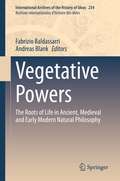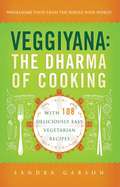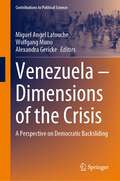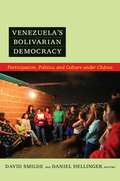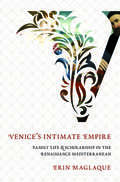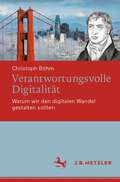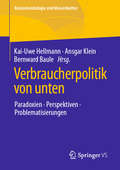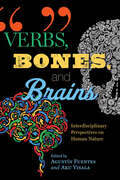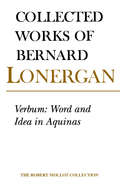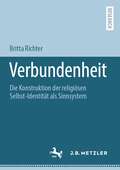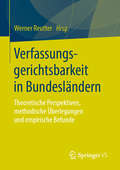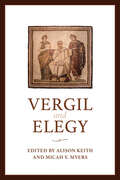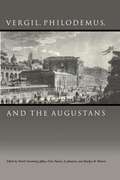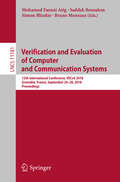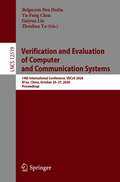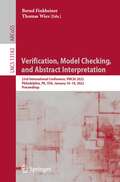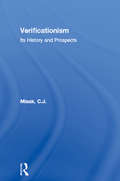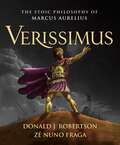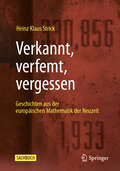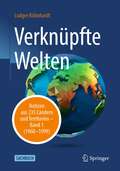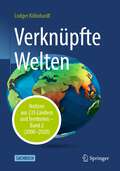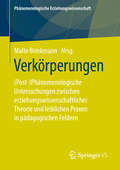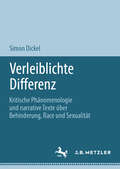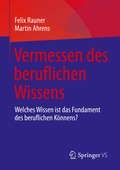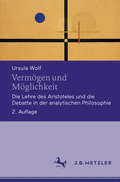- Table View
- List View
Vegetative Powers: The Roots of Life in Ancient, Medieval and Early Modern Natural Philosophy (International Archives of the History of Ideas Archives internationales d'histoire des idées #234)
by Andreas Blank Fabrizio BaldassarriThe volume analyzes the natural philosophical accounts and debates concerning the vegetative powers, namely nutrition, growth, and reproduction. While principally focusing on the early modern approaches to the lower functions of the soul, readers will discover the roots of these approaches back to the Ancient times, as the volume highlights the role of three strands that help shape the study of life in the Medieval and early modern natural philosophies. From late antiquity to the early modern period, the vegetative soul and its cognate concepts have played a substantial role in specifying life, living functions, and living bodies, sometimes blurring the line between living and non-living nature, and, at other moments, resulting in a strong restriction of life to a mechanical system of operations and powers. Unearthing the history of the vegetative soul as a shrub of interconnected concepts, the 24 contributions of the volume fill a crucial gap in scholarship, ultimately outlining the importance of vegetal processes of incessant proliferation, generation, and organic growth as the roots of life in natural philosophical interpretations.
Veggiyana
by Michelle Antonisse Sandra GarsonThe kitchen is the most vital place on Earth, because survival, even now in the age of iPads and large hadron colliders, still depends on wholesome, nutritious food. In keeping with this simple truth Veggiyana provides 108 tasty, beloved and simple recipes from around the world. And generously sprinkled throughout--like the perfect blend of herbs and spices are morsels of time-tested wisdom on how to live a life that nourishes both body and spirit. Veggiyana brings the vitality of the worlds kitchens to your own with wisdom and recipes to delight and inspire.
Venezuela – Dimensions of the Crisis: A Perspective on Democratic Backsliding (Contributions to Political Science)
by Wolfgang Muno Miguel Angel Latouche Alexandra GerickeThe book is devoted to the subject of Venezuela's politics and the different dimensions of its longstanding crisis, with various researchers exchanging ideas on the current problems affecting the country. It is the first comprehensive overview on the dimensions of Venezuela’s current crisis written in English, thus filling an important research gap. Especially the participation of international, well-known scholars make it a global enterprise. The book covers historical and theoretical facts surrounding the case of Venezuela and also focuses on the parties and actors that play decisive roles in the conflict. Subjects include the military, public administration, ideology, the opposition, the party landscape along with its crisis and Venezuela's oil policy. Furthermore the book touches upon international and regional aspects: Venezuela's diplomatic relations with the EU, the USA, Cuba and Colombia, respectively. The volume addresses a wider audience, such as scholars on Latin American and especially Venezuelan Politics, International Relations, as well as an interested public, including journalists and politicians.
Venezuela's Bolivarian Democracy: Participation, Politics, and Culture Under Chávez
by David Smilde Daniel HellingerVenezuela's Bolivarian Democracy brings together a variety of perspectives on participation and democracy in Venezuela. An interdisciplinary group of contributors focuses on the everyday lives of Venezuelans, examining the forms of participation that have emerged in communal councils, cultural activities, blogs, community media, and several other forums. The essays validate many of the critiques of democracy under Chvez, as well as much of the praise. They show that while government corporatism and clientelism are constant threats, the forms of political and cultural participation discussed are creating new discourses, networks, and organizational spaces--for better and for worse. With open yet critical minds, the contributors seek to analyze Venezuela's Bolivarian democratic experience through empirical research. In doing so, they reveal a nuanced process, a richer and more complex one than is conveyed in international journalism and scholarship exclusively focused on the words and actions of Hugo Chvez. Contributors Carolina Acosta-Alzuru Julia Buxton Luis Duno Gottberg Sujatha Fernandes Mara Pilar Garca-Guadilla Kirk A. Hawkins Daniel Hellinger Michael E. Johnson Luis E. Lander Margarita Lpez-Maya Elizabeth Gackstetter Nichols Coraly Pagan Guillermo Rosas Naomi Schiller David Smilde Alejandro Velasco
Venice's Intimate Empire: Family Life and Scholarship in the Renaissance Mediterranean
by Erin MaglaqueMining private writings and humanist texts, Erin Maglaque explores the lives and careers of two Venetian noblemen, Giovanni Bembo and Pietro Coppo, who were appointed as colonial administrators and governors. In Venice’s Intimate Empire, she uses these two men and their families to showcase the relationship between humanism, empire, and family in the Venetian Mediterranean.Maglaque elaborates an intellectual history of Venice’s Mediterranean empire by examining how Venetian humanist education related to the task of governing. Taking that relationship as her cue, Maglaque unearths an intimate view of the emotions and subjectivities of imperial governors. In their writings, it was the affective relationships between husbands and wives, parents and children, humanist teachers and their students that were the crucible for self-definition and political decision making. Venice’s Intimate Empire thus illuminates the experience of imperial governance by drawing connections between humanist education and family affairs. From marriage and reproduction to childhood and adolescence, we see how intimate life was central to the Bembo and Coppo families’ experience of empire. Maglaque skillfully argues that it was within the intimate family that Venetians’ relationships to empire—its politics, its shifting social structures, its metropolitan and colonial cultures—were determined.
Verantwortungsvolle Digitalität: Warum wir den digitalen Wandel gestalten sollten
by Christoph BöhmDigitale Produkte, Dienste sowie Kommunikationsformen zeichnen sich besonders dadurch aus, dass sie im physikalischen Sinne immateriell sind. Aus dieser Eigenschaft folgen vielfältige Möglichkeiten, Lebenspraktiken und Lebenswelten individuell zu gestalten. Leicht zu verbreitende Digitalprodukte vermitteln gesteigerte Wirksamkeitserfahrung, welche den Digitalen Wandel wirtschaftlich, technisch und gesellschaftlich in Gang hält. Wachstumsgrenzen scheinen durch disruptive Innovationen der Künstlichen Intelligenz, der digitalen Vernetzung sowie auch der Virtualisierung von Lebenswelten zu diffundieren. Ein systemischer Blick auf die Veränderungsdynamiken führt zur Einsicht, dass Anerkennungswettläufe zur Sicherung der sozialen Position entbrennen. Um einer Abwärtsspirale zu entfliehen, fühlen sich Individuen sowie wirtschaftliche Akteure genötigt, Verwirklichungschancen der Digitaltechnologie ergreifen zu müssen, da ansonsten die Todeserfahrung einer sozialen oder wirtschaftlichen Irrelevanz droht. Diesem Krisenphänomen setzt das Buch eine Idee entgegen, wie aus selbstfürsorglicher Integrität heraus eine lebensdienliche und vor allem gerechte Digitalität verwirklicht werden könnte.
Verbraucherpolitik von unten: Paradoxien, Perspektiven, Problematisierungen (Konsumsoziologie und Massenkultur)
by Ansgar Klein Kai-Uwe Hellmann Bernward BauleVerbraucherpolitik wurde in Deutschland seit ihrem Bestehen in den 1950er Jahren vorwiegend als ein Aktions‐ und Maßnahmenbündel verstanden und betrieben, das in erster Linie staatlicherseits initiiert und institutionalisiert wurde. Oftmals auch wurden von Staats wegen entsprechende Aufträge erteilt und Fördermodelle aufgesetzt, wodurch ein Erscheinungsbild entstand, als ob man es im Grunde nur mit einer durch die Makropolitik verordneten ‚Verbraucherpolitik von oben‘ herab zu tun hätte. Nicht, dass in diesen zurückliegenden Jahrzehnten nicht auch immer wieder Versuche unternommen worden wären, verbraucherpolitische Anstöße aus der Mitte der Zivilgesellschaft – oft in Gestalt kleiner Bürgerinitiativen – zu geben. Und gerade in den letzten Jahren sind einige neue Verbraucherorganisationen entstanden, die ungleich basisnäher operieren. Dennoch scheint sich bei den großen, regierungsnahen ‚Playern‘ im Feld, die schon jahrzehntelang im ‚Geschäft‘ sind, von der regierungsinternen Verbraucherpolitik ganz zu schweigen, der Eindruck festgesetzt zu haben, Verbraucherpolitik betreffe ein Politikfeld, das im Wesentlichen durch eine Kollaboration von Staat einerseits, sämtliche Verbraucher und Verbraucherinnen gleichermaßen vertretenden Verbraucherschutzorganisationen andererseits bestellt wird, während die vielen kleinen Verbraucherinitiativen, von einzelnen engagierten Verbrauchern oder Verbraucherinnen gar nicht erst angefangen, demgegenüber regelmäßig ins Hintertreffen geraten. Diese Perspektive bezieht sich größtenteils auf die Sicht auf und aus dem Zentrum der Politik heraus. Diesem institutionell vorherrschenden Eindruck, es gäbe im Prinzip nur ‚Verbraucherpolitik von oben‘, die wirklich schlag‐ und durchsetzungsfähig sei, soll mit diesem Band ein Stück weit entgegengewirkt werden.
Verbs, Bones, and Brains: Interdisciplinary Perspectives on Human Nature
by Agustín Fuentes and Aku Visala&“A benchmark collection of essays on the contemporary understanding of human nature. . . . [engaging] biology and anthropology to theology and philosophy.&” —Robin W. Lovin, Cary M. Maguire University Professor of Ethics emeritus, Southern Methodist University, author of What Do We Do When No One is Listening: Leading the Church in a Polarized Society The last few decades have seen an unprecedented surge of empirical and philosophical research into the evolutionary history of Homo sapiens, the origins of the mind/brain, and human culture. This research has sparked heated debates about the nature of human beings and how knowledge about humans from the sciences and humanities should be properly understood. The goal of Verbs, Bones, and Brains: Interdisciplinary Perspectives on Human Nature is to engage these themes and present current debates, discussions, and discourse for a range of readers. The contributors bring the discussion to life with key experts outlining major concepts paired with cross-disciplinary commentaries in order to create a novel approach to thinking about, and with, human natures. Throughout, they emphasize the importance of seeking a convergence in our views on human nature, despite metaphysical disagreements. They caution that if convergence eludes us and a common ground cannot be found, this is itself a relevant result: it would reveal to us how deeply our questions about ourselves are connected to our basic metaphysical assumptions. Instead, their focus is on how the interdisciplinary and possibly transdisciplinary conversation can be enhanced in order to identify and develop a common ground on what constitutes human nature. &“A landmark volume. . . . It shows the fruitfulness of a mutually respectful and yet rigorous approach to cross-disciplinary engagement.&” (William Storrar, Center of Theological Inquiry, Princeton, NJ, editor of A World for All?: Global Civil Society in Political Theory and Trinitarian Theology &“Fascinating, well-organized, and well-edited.&” —Choice
Verbum: Word and Idea in Aquinas, Volume 2
by Bernard Lonergan Robert Doran, S.J. Frederick Crowe, S.J.Bernard Lonergan's theological writings have influenced religious scholars ever since the first publication in the 1940s of the series of five articles which make up Verbum: Word and Idea in Aquinas. These articles first appeared in Theological Studies and were subsequently republished in book form in 1967 under the present title. This volume contains a new preface by the editors and full translations of all Latin texts.Verbum: Word and Idea in Aquinas is a product of Lonergan's eleven years of study of the thought of Thomas Aquinas. The work is considered by many to be a breakthrough in the history of Lonergan's theology and a foundation upon which his later contributions were constructed. Here he interprets aspects in the writing of Aquinas relevant to trinitarian theory and, as in most of Lonergan's work, one of the principal aims is to assist the reader in the search to understand the workings of the human mind.Verbum: Word and Idea in Aquinas is a vital component of Lonergan's oeuvre, and of continuing relevance to trinitarian theology, Aquinas studies, and inquiries into human cognition.Bernard Lonergan (1904-1984), a professor of theology, taught at Regis College, Harvard University, and Boston College. An established author known for his Insight and Method in Theology, Lonergan received numerous honorary doctorates, was a Companion of the Order of Canada in 1971 and was named as an original members of the International Theological Commission by Pope Paul VI.
Verbundenheit: Die Konstruktion der religiösen Selbst-Identität als Sinnsystem
by Britta RichterIst Verbundenheit, wie Studien nahelegen, die Essenz von Spiritualität? Und wie könnte ein Religionsmodell aussehen, das auf Verbundenheit als religiöse Bewusstseinsqualität aufbaut? Auf Basis qualitativer Daten aus Interviews mit Langzeitpraktizierenden aus spirituellen und künstlerischen Handlungsfeldern, entwickelt Britta Richter, im Gefolge phänomenologischer Lebensweltanalyse (Luckmann/Schütz), Modelle religiöser Selbst-Identität. Die Autorin folgt in phänomenologischen Analysen den narrativen Sinn-Konstruktionen zu ihrem Ursprung im praktischen Tun. Sie zeigt auf, dass Bindungen an Sinn-Quellen (Charles Taylor), Praktiken und Habitus, einer ontologischen Handlungslogik des Seins-Bewusstseins folgen und rekonstruiert, wie im Zwischenraum von Immanenz und Transzendenz, Welt-Beziehung und Seins-Beziehung, bedingtem und unbedingtem Sinn, Seins-Sinn-Bewusstsein verkörpert wird (religio). Unter Aufnahme bindungstheoretischer und theologischer Ansätze, wird ein Verständnis von symbolischer Identität entwickelt, in dem sich das Selbst, in der Praxis von Verbundenheit, Selbst-Transzendenz und Transformation, durch Selbstdeutung in der Gesellschaft, als verkörperte Religion seiner religio, individuiert.
Verfassungsgerichtsbarkeit in Bundesländern: Theoretische Perspektiven, methodische Überlegungen und empirische Befunde
by Werner ReutterDer Band gibt eine theoretische und empirische Bestandsaufnahme der Verfassungsgerichtsbarkeit in den Bundesländern. Neben dem einleitenden Beitrag beinhaltet er politik- und rechtswissenschaftliche Untersuchungen zu vier Themenkomplexen: Im ersten Teil werden theoretische und methodische Ansätze zur Analyse von Verfassungsgerichtsbarkeit auf nationaler und subnationaler Ebene vorgestellt und kritisch beleuchtet. Der zweite Teil beschäftigt sich mit historischen, institutionellen und soziologischen Voraussetzungen der Verfassungsrechtsprechung in den Ländern. Im dritten Teil wird der Einfluss der Landesverfassungsgerichte in mehreren Politikfeldern dargestellt und analysiert. Im abschließenden vierten Teil wird die Verfassungsgerichtsbarkeit in den Schweizer Kantonen sowie in den amerikanischen Bundesstaaten untersucht. Darüber hinaus wird die Rolle der Landesverfassungsgerichte im Rahmen der europäischen Integration analysiert.Der InhaltTheoretische Perspektiven und methodische Überlegungen • Historische, institutionelle und soziologische Voraussetzungen der Verfassungsberichtsbarkeit in Bundesländern • Landesverfassungsgerichtsbarkeit und Politik • Internationale und vergleichende PerspektivenDer HerausgeberPD Dr. Werner Reutter ist Politikwissenschaftler und Privatdozent an der Humboldt-Universität zu Berlin.
Vergil and Elegy (Phoenix Supplementary Volumes #60)
by Alison Keith Micah Y. MyersBorn in 70 BCE, the Roman poet Vergil came of age during a period of literary experimentalism among Latin authors. These authors introduced new Greek verse forms and metres into the existing repertoire of Latin poetic genres and measures, foremost among them being elegy, a genre that the ancients thought originated in funeral lament, but which in classical Rome became first-person poetry about the poet-lover’s amatory vicissitudes. Despite the influence of notable elegists on Vergil’s early poetry, his critics have rarely paid attention to his engagement with the genre across his body of work. This collection is devoted to an exploration of Vergil’s multifaceted relations with elegy. Contributors shed light on Vergil’s interactions with the genre and its practitioners across classical, medieval, and early modern periods. The book investigates Vergil’s hexameter poetry in relation to contemporary Latin elegy by Gallus, Tibullus, and Propertius, and the subsequent reception of Vergil’s radical combination of epic with elegy by later Latin and Italian authors. Filling a striking gap in the scholarship, Vergil and Elegy illuminates the famous poet’s wide-ranging engagement with the genre of elegy across his oeuvre.
Vergil, Philodemus, and the Augustans
by Jeffrey Fish David ArmstrongThe Epicurean teacher and poet Philodemus of Gadara (c. 110-c. 40/35 BC) exercised significant literary and philosophical influence on Roman writers of the Augustan Age, most notably the poets Vergil and Horace. <P><P>Yet a modern appreciation for Philodemus' place in Roman intellectual history has had to wait on the decipherment of the charred remains of Philodemus' library, which was buried in Herculaneum by the eruption of Vesuvius in 79 AD. As improved texts and translations of Philodemus' writings have become available since the 1970s, scholars have taken a keen interest in his relations with leading Latin poets.
Verification and Evaluation of Computer and Communication Systems: 12th International Conference, VECoS 2018, Grenoble, France, September 26–28, 2018, Proceedings (Lecture Notes in Computer Science #11181)
by Mohamed Faouzi Atig Saddek Bensalem Simon Bliudze Bruno MonsuezThis book constitutes the proceedings of the 12th International Conference on Verification and Evaluation of Computer and Communication Systems ( VECoS 2018) held at Grenoble, France, in September 2018. The 11 full papers in this volume, presented together with one abstract and two invited papers, were carefully reviewed and selected from 23 submissions. The aim of the VECoS conference is to bring together researchers and practitioners in the areas of verification, control, performance, and dependability evaluation in order to discuss state of the art and challenges in modern computer and communication systems in which functional and extra-functional properties are strongly interrelated. Thus, the main motivation for VECoS is to encourage the cross-fertilization between various formal verification and evaluation approaches, methods and techniques, and especially those developed for concurrent and distributed hardware/software systems.
Verification and Evaluation of Computer and Communication Systems: 14th International Conference, VECoS 2020, Xi'an, China, October 26–27, 2020, Proceedings (Lecture Notes in Computer Science #12519)
by Yu-Fang Chen Belgacem Ben Hedia Gaiyun Liu Zhenhua YuThis book constitutes the proceedings of the 14th International Conference on Verification and Evaluation of Computer and Communication Systems, VECoS 2020, which was supposed to be held in Xi’an, China, in October 2020, but was held virtually instead. The 19 full papers and 1 short paper presented in this volume were carefully reviewed and selected from 60 submissions. The aim of the VECoS conference is to bring together researchers and practitioners in the areas of verification, control, performance, and dependability evaluation in order to discuss state of the art and challenges in modern computer and communication systems in which functional and extra-functional properties are strongly interrelated. Thus, the main motivation for VECoS is to encourage the cross-fertilization between various formal verification and evaluation approaches, methods and techniques, and especially those developed for concurrent and distributed hardware/software systems. The papers are organized in the following topical sections: petri-net, simulation, and scheduling; formal modeling and verification, testing; and artificial intelligence and machine learning.
Verification, Model Checking, and Abstract Interpretation: 23rd International Conference, VMCAI 2022, Philadelphia, PA, USA, January 16–18, 2022, Proceedings (Lecture Notes in Computer Science #13182)
by Bernd Finkbeiner Thomas WiesThis book constitutes the proceedings of the 23rd International Conference on Verification, Model Checking, and Abstract Interpretation, VMCAI 2022, which took place in Philadelphia, PA, USA, in January 2022.The 22 papers presented in this volume were carefully reviewed from 48 submissions. VMCAI provides a forum for researchers working on verification, model checking, and abstract interpretation and facilitates interaction, cross-fertilization, and advancement of hybrid methods that combine these and related areas.
Verificationism: Its History and Prospects (Philosophical Issues in Science)
by C.J. MisakVerificationism is the first comprehensive history of a concept that dominated philosophy and scientific methodology between the 1930s and the 1960s. The verificationist principle - the concept that a belief with no connection to experience is spurious - is the most sophisticated version of empiricism. More flexible ideas of verification are now being rehabilitated by a number of philosophers.C.J. Misak surveys the precursors, the main proponents and the rehabilitators. Unlike traditional studies, she follows verificationist theory beyond the demise of positivism to examine its reappearance in the work of modern philosophers. Most interestingly, she argues that despite feminism's strenuous opposition to positivism, verificationist thought is at the heart of much of contemporary feminist philosophy.Verificationism is an excellent assessment of a major and influential system of thought.
Verissimus: The Stoic Philosophy of Marcus Aurelius
by Donald J. RobertsonIn the tradition of Logicomix, Donald J. Robertson's Verissimus is a riveting graphic novel on the life and stoic philosophy of Marcus Aurelius.Marcus Aurelius was the last famous Stoic of antiquity but he was also to become the most powerful man in the known world – the Roman emperor. After losing his father at an early age, he threw himself into the study of philosophy. The closest thing history knew to a philosopher-king, yet constant warfare and an accursed plague almost brought his empire to its knees. “Life is warfare”, he wrote, “and a sojourn in foreign land!” One thing alone could save him: philosophy, the love of wisdom!The remarkable story of Marcus Aurelius’ life and philosophical journey is brought to life by philosopher and psychotherapist Donald J. Robertson, in a sweeping historical epic of a graphic novel, based on a close study of the historical evidence, with the stunning full-color artwork of award-winning illustrator Zé Nuno Fraga.
Verkannt, verfemt, vergessen: Geschichten aus der europäischen Mathematik der Neuzeit
by Heinz Klaus StrickSobald Sie sich eingehender mit der Geschichte der Mathematik beschäftigen, werden Sie auch auf Personen stoßen, deren Namen Ihnen bislang unbekannt waren oder von deren Bedeutung für die Entwicklung der Mathematik Sie bisher nichts wussten. Dieses Buch bietet Ihnen einen Einblick in das Leben und Wirken von 67 besonderen Persönlichkeiten aus dem europäischen Raum – und geht bei der Betrachtung der Einzelschicksale jeweils auch der Frage nach, warum diese Personen vergleichsweise unbekannt sind, warum sie regelrecht „vergessen“ wurden. Die Gründe dafür sind vielfältig und meist in den jeweiligen politischen, gesellschaftlichen oder individuellen Lebensumständen zu finden – viele wurden diskriminiert und konnten ihre Fähigkeiten gar nicht erst entfalten, andere waren Ihrer Zeit voraus und blieben lange Zeit unverstanden. Über die historische Einordnung hinaus werden einige der mathematischen Beiträge dieser Personen dargestellt – so ausgewählt, dass sie mit denin der gymnasialen Oberstufe üblicherweise vermittelten Kenntnissen nachvollzogen werden können. Die in diesem Buch enthaltenen Darstellungen beginnen mit Persönlichkeiten aus dem 16. Jahrhundert und schließen somit chronologisch an das Buch Geschichten aus der Mathematik desselben Autors an, sind aber unabhängig davon lesbar. Das Buch richtet sich an alle, die sich für die Entwicklung der Wissenschaften interessieren und dabei insbesondere ein tieferes Verständnis für die menschlichen Aspekte der Mathematik entwickeln möchten.
Verknüpfte Welten: Notizen aus 235 Ländern und Territorien – Band 1 (1960-1999)
by Ludger KühnhardtDie Aufzeichnungen, die Ludger Kühnhardt in 235 Ländern und Territorien der Erde verfasst hat, lassen ein faszinierendes Panorama entstehen, gespiegelt in persönlichen Eindrücken, Begegnungen und Erfahrungen eines in aller Welt tätigen Politikwissenschaftlers und Publizisten. Das Buch rekonstruiert die Verknüpfungen zwischen den Transformationen Europas und dem entstehenden globalen Zeitalter während sechs Jahrzehnten ab 1960 bis zur Schwelle der post-Corona-Welt 2020.
Verknüpfte Welten: Notizen aus 235 Ländern und Territorien – Band 2 (2000-2020)
by Ludger KühnhardtDie Aufzeichnungen, die Ludger Kühnhardt in 235 Ländern und Territorien der Erde verfasst hat, lassen ein faszinierendes Panorama entstehen, gespiegelt in persönlichen Eindrücken, Begegnungen und Erfahrungen eines in aller Welt tätigen Politikwissenschaftlers und Publizisten. Das Buch rekonstruiert die Verknüpfungen zwischen den Transformationen Europas und dem entstehenden globalen Zeitalter während sechs Jahrzehnten ab 1960 bis zur Schwelle der post-Corona-Welt 2020.
Verkörperungen: (Post-)Phänomenologische Untersuchungen zwischen erziehungswissenschaftlicher Theorie und leiblichen Praxen in pädagogischen Feldern (Phänomenologische Erziehungswissenschaft #9)
by Malte BrinkmannIn dem Buch werden praxeologische, poststrukturalistische, hermeneutische, ethnographische und videographische Erkundungen im (post-)phänomenologischen Feld der Pädagogik vorgestellt. Aus sozial-, allgemein-, früh-, heil- und grundschulpädagogischer Perspektive werden Studien zu individuellen, gemeinschaftlichen, habituellen, kommunikativen und stimmungsbezogenen Momenten der Verkörperung präsentiert.
Verleiblichte Differenz: Kritische Phänomenologie und narrative Texte über Behinderung, Race und Sexualität
by Simon DickelDieses Buch untersucht, wie phänomenologische Ansätze zu den Themen Verleiblichung, Wahrnehmung und gelebte Erfahrung innerhalb der Disability Studies, der Critical Race Theory und der Queer Studies diskutiert werden. Auf Grundlage dieser Disziplinen analysiert der Autor Autobiografien und Romane, die sich mit den Folgen von Stigmatisierung und den körperlichen Dimensionen sozialer Ungleichheit auseinandersetzen. Die untersuchten Texte sind Robert F. Murphys The Body Silent, Simi Lintons My Body Politic, Rod Michalkos The Two-in-One: Walking with Smokie, Walking with Blindness, drei autobiografische Texte von Stephen Kuusisto, Vincent O. Carters The Bern Book sowie zwei Romane, Matthew Griffin's Hide und Armistead Maupin's Maybe the Moon. All dieseTexte haben die Bedeutung von Körpergedächtnis und Wahrnehmungsgewohnheiten, den Einfluss von Sprache und Kultur für Prozesse der Verleiblichung, die Bedeutung von Relationalität und Gemeinschaft,die Auswirkungen von Beleidigung und Nichtanerkennung sowie Emanzipation und soziale Anerkennung zum Thema. Folglich werden sie als bahnbrechende Beiträge zur kritischen Phänomenologie diskutiert.
Vermessen des beruflichen Wissens: Welches Wissen ist das Fundament des beruflichen Könnens?
by Felix Rauner Martin AhrensWir zeigen in diesem Buch die Ablösung der am wissenschaftlichen Wissen orientierten fachsystematisch strukturierten akademischen und beruflichen Bildung durch das berufliche Handlungswissen. Dieses Arbeitsprozesswissen ist die Grundlage für die Aneignung der in der Arbeitswelt an Bedeutung zunehmenden Gestaltungskompetenz beruflicher Fachkräfte.Es wird ein modernes, berufspädagogisch begründetes Wissenskonzept entfaltet und dokumentiert. Im ersten Teil des Buches wird das Konzept des beruflichen Wissens entfaltet, im zweiten Teil werden empirische Ergebnisse aus COMET-Projekten dokumentiert, an denen das in unterschiedlichen Berufen vermittelte berufliche Wissen abgelesen werden kann.Es gibt seit Jahrzehnten eine verwirrende Diskussion über das berufliche Wissen. Die KMK hat 1991 mit der Leitidee der beruflichen Gestaltungskompetenz ein neues Konzept für die berufliche Bildung vereinbart. Offen blieb, auf welchem beruflichen Wissen diese neue Leitidee basieren solle. Es fehlte bisher eine originäre berufspädagogische Begründung für das der beruflichen Gestaltungskompetenz zugrunde liegende berufliche Wissen.
Vermögen und Möglichkeit: Die Lehre des Aristoteles und die Debatte in der analytischen Philosophie
by Ursula WolfWährend die griechische Philosophie lange auf das Notwendige als Basis sicherer Erkenntnis fokussiert war, spielen in der Metaphysik des Aristoteles der Begriff des Vermögens und der Möglichkeit eine zentrale Rolle. Der erste Teil des Buchs erläutert die Hintergründe dieser Neuerung und das Zusammenspiel der Begriffe von Vermögen, Möglichkeit und Notwendigkeit bei Aristoteles. Heute hat die Thematik sich weit verzweigt. So gibt es Untersuchungen über epistemische, logische, kausale Möglichkeit und Notwendigkeit sowie über Dispositionen, Fähigkeiten und das Kann der Handlungsfreiheit, wobei diese Forschungen unverbunden nebeneinander stehen. Vor dem Hintergrund der komplexen aristotelischen Theorie wird daher im zweiten Teil des Buchs versucht, die wichtigsten Teilbedeutungen nicht nur als solche zu klären, sondern auch einen systematischen Zusammenhang zwischen ihnen herauszuarbeiten.
